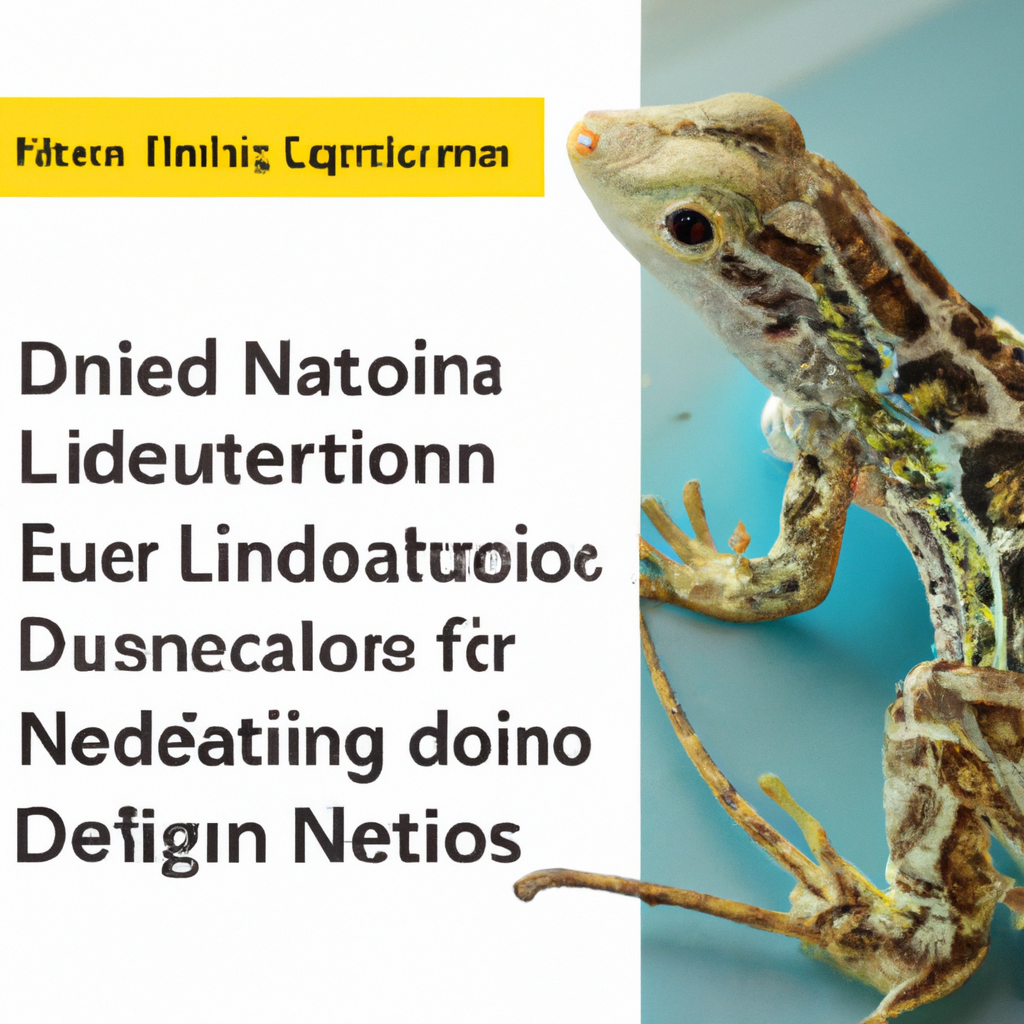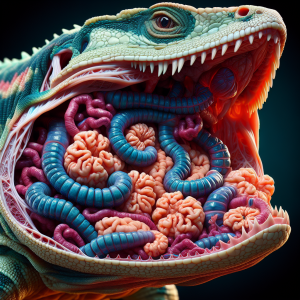Introduction: Importance of Nutrition for Pet Lizards
You know, when I first got my pet lizard, I didn’t realize just how crucial nutrition was for their health. I remember one time noticing that my lizard seemed lethargic and wasn’t eating much. After some research, I discovered that it could be due to a nutritional deficiency. That experience really opened my eyes to the importance of understanding and addressing nutritional needs in pet lizards. It’s amazing how proper nutrition can make such a difference in their overall well-being.
Common Nutritional Deficiencies in Pet Lizards
Did you know that pet lizards are prone to certain common nutritional deficiencies that can affect their health and well-being? It’s fascinating to learn about the specific nutrients that these unique reptiles need to thrive. From calcium and vitamin D3 to essential vitamins and minerals, there’s a lot to consider when it comes to ensuring your pet lizard’s diet is well-balanced.
When it comes to common nutritional deficiencies in pet lizards, it’s essential to be aware of the signs and symptoms that may indicate an imbalance. For example, issues like metabolic bone disease, which is often caused by a lack of calcium and vitamin D3, can have serious consequences for your lizard’s skeletal health.
By understanding the specific dietary requirements of different lizard species, you can tailor their nutrition to meet their individual needs. Whether you have a bearded dragon, leopard gecko, or iguana, each type of lizard has its own nutritional demands that should be addressed to prevent deficiencies.
Exploring the world of lizard nutrition can be both educational and rewarding. By taking the time to learn about common deficiencies and how to address them, you can ensure that your scaly friend stays healthy and happy for years to come. So, let’s dive into the fascinating realm of identifying and addressing nutritional deficiencies in pet lizards!
Recognizing Symptoms of Nutritional Imbalances
Let me tell you about recognizing symptoms of nutritional imbalances in pet lizards. Picture this – I once noticed my friend’s lizard, Rex, becoming lethargic and losing its appetite. At first, we thought Rex was just having a lazy day, but after a little research, we realized these could be signs of a nutritional deficiency.
Nutritional imbalances in lizards can manifest in various ways, and it’s crucial to pay attention to any changes in your pet’s behavior or physical appearance. For instance, if you observe weight loss, unusual skin conditions, or changes in activity levels, these could indicate that your lizard is not getting the nutrients it needs.
Did you know that certain deficiencies can impact a lizard’s growth, reproduction, and overall health? It’s fascinating how something as seemingly minor as a lack of calcium or Vitamin D can have significant effects on these reptiles. So, keeping a close eye on your lizard’s well-being is essential to catch any signs of nutritional deficiencies early on.
Recognizing these symptoms early can help you take proactive steps to address the issue. Apart from consulting a vet, making adjustments to your lizard’s diet and ensuring they have access to proper lighting and supplements can play a crucial role in restoring their nutritional balance. Remember, prevention is key!
Have you ever wondered how these tiny creatures rely on us to provide them with the right nutrition? It’s a big responsibility, but by learning to spot the signs of nutritional deficiencies, we can ensure our scaly friends lead happy and healthy lives. So, next time you see your pet lizard acting a bit off, don’t ignore it – they might just be trying to tell you something about their diet!
Dietary Guidelines for Pet Lizards
Let me tell you about the dietary guidelines for pet lizards. It’s crucial to ensure that your scaly friend is getting the right nutrition to stay healthy and happy. When I first got my pet lizard, I wasn’t aware of how important their diet was. I thought feeding them insects was enough, but I soon learned that their nutritional needs are more complex than that.
Did you know that pet lizards have specific dietary requirements based on their species? It’s fascinating how different types of lizards have varying needs when it comes to vitamins, minerals, and protein sources. For example, herbivorous lizards like iguanas need a diet rich in leafy greens and vegetables, while insectivorous lizards like geckos require a diet high in live insects.
One challenge many lizard owners face is finding the right balance of nutrients for their pets. It can be tricky to ensure that your lizard is getting all the essential vitamins and minerals they need to thrive. That’s why it’s essential to do your research and consult with a veterinarian who specializes in reptiles to create a well-rounded diet plan.
A practical tip I picked up along the way is to provide a variety of food options for your pet lizard. Offering a diverse range of insects, fruits, vegetables, and supplements can help prevent nutritional deficiencies and keep your lizard healthy. Experimenting with different foods can also keep mealtime exciting for your pet!
Have you ever wondered how the nutritional needs of pet lizards compare to those of wild lizards? It’s interesting to think about how captivity can impact their diet and health. By understanding the dietary guidelines for pet lizards, we can ensure that our scaly companions lead long, happy lives in our care.
Supplement Options for Nutritional Deficiencies
You know, when it comes to supplement options for addressing nutritional deficiencies in pet lizards, there can be quite a bit of controversy in the reptile-keeping community. Some people swear by certain supplements, claiming they work wonders for their lizards, while others are skeptical and prefer to stick to a more natural diet approach. It’s a bit of a hot topic, to be honest.
I remember reading about a debate on an online reptile forum where two lizard owners had a heated discussion about whether calcium supplements were necessary for their pet lizards. One person argued that calcium supplements were crucial for preventing metabolic bone disease, a common issue in reptiles, while the other believed that a varied diet rich in calcium-rich foods like leafy greens and insects should be sufficient.
It’s interesting because both arguments had valid points. On one hand, supplements can provide a quick and easy way to ensure your lizard is getting all the necessary nutrients, especially if their diet is lacking in certain areas. On the other hand, some supplements can be overused or cause toxicity if not administered correctly.
Navigating this controversy can be tricky for lizard owners who just want what’s best for their scaly friends. It’s essential to do thorough research, consult with a reptile veterinarian, and perhaps even experiment a bit to find the right balance for your specific lizard’s needs.
What are your thoughts on this debate? Do you lean more towards using supplements or prefer a natural diet approach for your pet lizard? It’s a fascinating topic to explore, and there’s no one-size-fits-all answer when it comes to addressing nutritional deficiencies in these unique creatures.
Seeking Veterinary Advice for Nutritional Concerns
Did you know that seeking veterinary advice for nutritional concerns in pet lizards is crucial for their well-being? When it comes to addressing nutritional deficiencies in your scaly companion, consulting a reptile-savvy veterinarian can make all the difference. These experts can provide tailored recommendations based on your lizard’s specific needs, helping you navigate the complex world of lizard nutrition with confidence.
Veterinarians specializing in reptiles possess the knowledge and experience required to identify and address nutritional imbalances effectively. They can conduct thorough examinations, recommend appropriate dietary adjustments, and suggest suitable supplements to ensure your pet lizard receives the essential nutrients it needs to thrive.
By seeking veterinary advice for nutritional concerns, you are not only taking proactive steps to safeguard your pet’s health but also benefiting from expert guidance that can enhance your lizard’s quality of life. Remember, prevention is key when it comes to addressing nutritional deficiencies in pet lizards, and early intervention can prevent serious health issues down the line.
So, the next time you notice any signs of nutritional deficiencies in your pet lizard, from lethargy to changes in appetite or skin condition, don’t hesitate to reach out to a reptile veterinarian. With their specialized knowledge and support, you can provide your scaly friend with the best possible care and ensure they lead a happy and healthy life. After all, a well-nourished lizard is a happy lizard!
Tips for Improving Lizard Nutrition
You know, when it comes to improving the nutrition of pet lizards, there’s a common challenge that many lizard owners face. It’s all about finding the right balance in their diet. You see, there’s a lot of conflicting information out there about what exactly to feed your lizard to ensure they are getting all the necessary nutrients.
Some people swear by feeding their lizards a diet consisting solely of insects, while others believe in a more varied approach that includes fruits and vegetables. The controversy lies in determining which approach is best for your specific lizard species and individual needs.
The challenge arises when you’re trying to navigate through all this conflicting advice and figure out what will work best for your pet. It can be overwhelming and confusing, especially if you’re new to lizard ownership.
But fear not! There are ways to overcome this challenge and ensure your pet lizard is getting the nutrition they need. One practical tip is to do thorough research on the specific dietary requirements of your lizard species. Understanding what they would naturally eat in the wild can give you valuable insights into how to replicate that diet in captivity.
Another approach is to consult with a reptile veterinarian or experienced lizard breeder who can provide personalized guidance based on your lizard’s individual needs. By seeking expert advice and experimenting with different foods, you can gradually find the right balance that works for your pet.
Navigating the challenge of improving lizard nutrition may require some trial and error, but with patience and dedication, you can ensure that your pet lizard stays healthy and happy for years to come.
Preventing Nutritional Deficiencies in Pet Lizards
You know, preventing nutritional deficiencies in pet lizards is all about taking proactive steps to ensure they are getting a well-rounded diet. One practical tip I can share with you is to offer a variety of foods to your lizard. Just like us, lizards need a diverse range of nutrients to stay healthy. By rotating their diet with different fruits, vegetables, insects, and commercial lizard food, you can help prevent deficiencies from occurring.
It’s essential to research and understand the specific nutritional needs of your pet lizard species. Some lizards may require more calcium or vitamin D, while others may need a higher protein intake. By tailoring their diet to meet these requirements, you can minimize the risk of deficiencies.
Another practical tip is to provide proper lighting and temperature in your lizard’s habitat. Lizards rely on UVB light to synthesize vitamin D, which is crucial for calcium absorption. Ensure that your pet has access to UVB light for a recommended amount of time each day to support their overall health.
Lastly, regular monitoring and observation are key. Keep an eye on your lizard’s behavior, appetite, and physical appearance. If you notice any signs of nutritional deficiencies, such as lethargy, weight loss, or abnormal shedding, consult a veterinarian promptly.
By following these practical tips and staying proactive in your approach to your pet lizard’s nutrition, you can help them thrive and lead a happy, healthy life. Remember, a well-fed lizard is a happy lizard!
Case Studies: Addressing Nutritional Deficiencies in Pet Lizards
Let me share a personal anecdote related to addressing nutritional deficiencies in pet lizards. A few years ago, my friend’s bearded dragon, Spike, started showing signs of sluggishness and a dull appearance. Concerned, my friend took Spike to the vet, who diagnosed him with a calcium deficiency. This experience highlighted the importance of proper nutrition for pet lizards and the impact it can have on their health.
When it comes to addressing nutritional deficiencies in pet lizards, it’s crucial to understand the significance of providing a well-balanced diet. Just like humans, lizards require specific nutrients to thrive and stay healthy. Ignoring their dietary needs can lead to various health issues, as Spike’s case demonstrated.
To ensure your pet lizard stays in optimal health, it’s essential to offer a variety of foods that meet their nutritional requirements. Incorporating calcium-rich foods like dark leafy greens, calcium supplements, and gut-loaded insects can help prevent deficiencies and promote strong bones and overall well-being.
Observing your lizard’s behavior and appearance can also give you valuable insights into their nutritional status. For instance, if your lizard is lethargic, has weak bones, or shows signs of stunted growth, it could indicate a potential deficiency that needs to be addressed promptly.
By proactively monitoring your pet lizard’s diet, seeking veterinary advice when needed, and making necessary adjustments to their nutrition, you can help prevent and address nutritional deficiencies effectively. Remember, a well-fed lizard is a happy and healthy lizard!
So, next time you interact with your scaly friend, keep an eye out for any signs of nutritional deficiencies and take proactive steps to ensure they receive the proper nutrients they need to thrive. Your pet lizard will thank you with its vibrant colors, energetic demeanor, and overall well-being.
Ensuring Optimal Health for Your Pet Lizard
Nutritional deficiencies in pet lizards can be quite a challenge for reptile owners to navigate. It’s not always easy to spot the signs of these deficiencies, especially since lizards are known to be masters at hiding their ailments. This challenge is further compounded by the controversy surrounding the best ways to address these nutritional issues.
Many lizard owners find themselves in a dilemma when trying to figure out the right diet and supplements to provide for their scaly companions. With conflicting information available online and from various sources, it can be overwhelming to determine the most effective approach.
Some controversies arise from debates over whether to rely solely on commercial diets or to incorporate more natural foods into a lizard’s nutrition plan. While commercial diets are convenient, they may not always provide the necessary nutrients for optimal health. On the other hand, incorporating natural foods can be beneficial but requires careful planning to ensure a balanced diet.
Another challenge that lizard owners face is the lack of clear guidelines on how to address specific nutritional deficiencies. Without proper guidance, it can be difficult to know which supplements or dietary adjustments are needed to correct imbalances and improve the lizard’s health.
Navigating these challenges and controversies requires a thoughtful and informed approach. Consulting with a reptile veterinarian or a knowledgeable reptile nutritionist can provide valuable insights and guidance tailored to your pet lizard’s specific needs. By staying informed, open-minded, and proactive in addressing nutritional deficiencies, you can ensure your pet lizard leads a healthy and thriving life.




